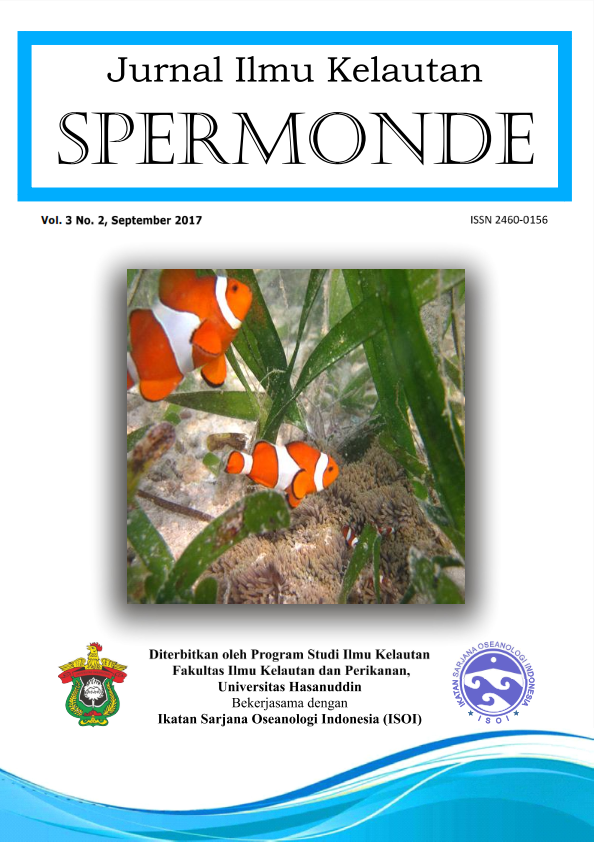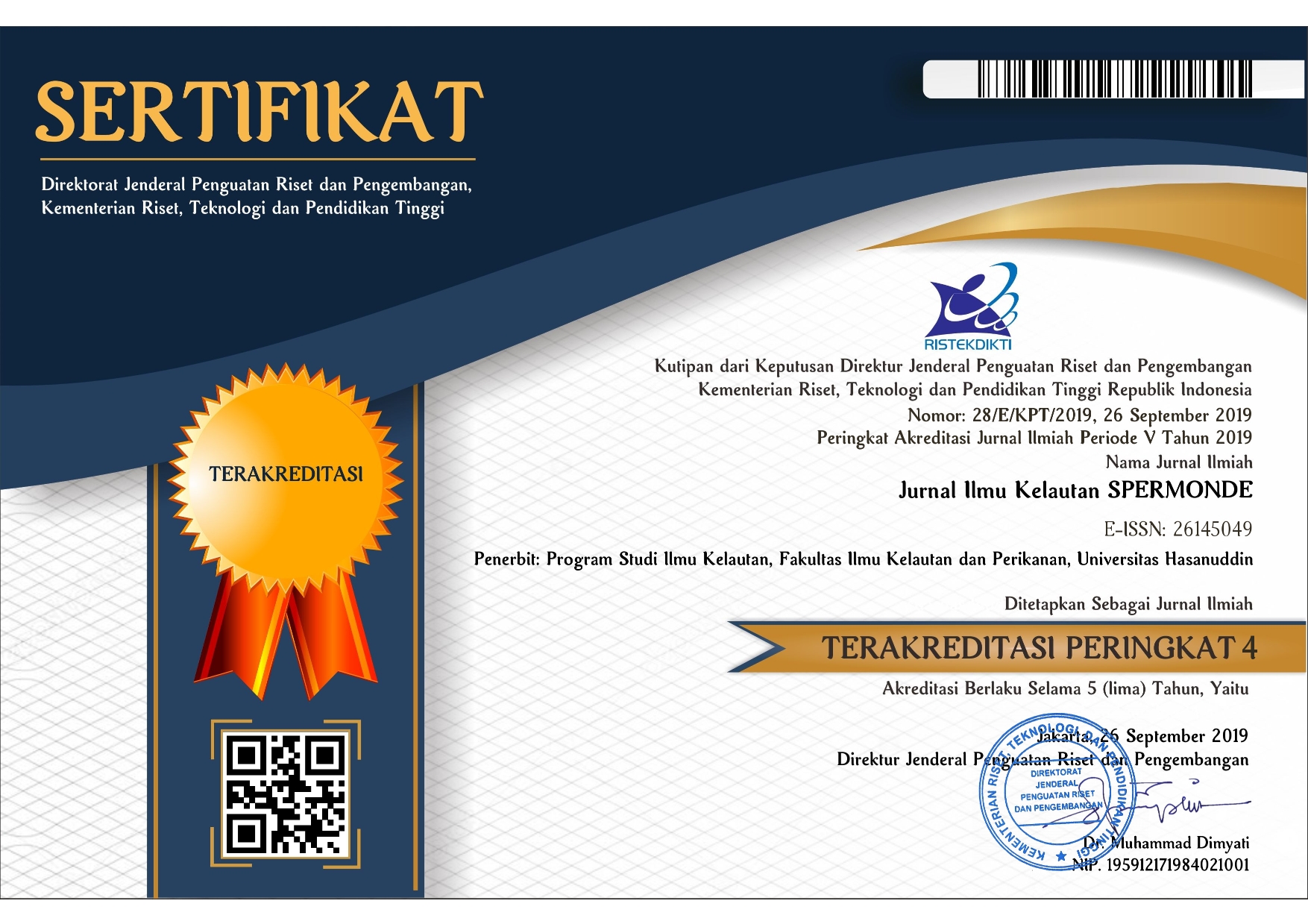KARAKTERISASI SPEKTRAL KONDISI PADANG LAMUN MENGGUNAKAN CITRA LANDSAT 8 OLI
DOI:
https://doi.org/10.20956/jiks.v3i2.3014Abstract
The high level of human activity in coastal areas has had an impact on seagrass beds. The advancement of satellite imaging technology makes monitoring seaweed conditions even easier. The purpose of this study was to identify the spectral reflectance patterns of different seagrass cover levels and make it the basis for mapping the seagrass condition on Barranglompo Island. Based on google earth has been determined 4 sampling stations that represent the spread of seagrass on Barranglompo Island. Each station is divided into 4 sub-stations from land to sea. Sampling of seagrass cover was carried out by the McKenzie (2003) method modified by close sampling, to 30 x 30 square meters following the spatial resolution of Landsat image 8. Each observation point was estimated the percentage of seagrass cover and the dominant species. Digital seagrass pixel extraction is performed from band 1 to 7 landsat 8 according to point position in the field and then grouped by cover class and condition. Seagrasses found in Barranglampo Island are 8 species: Enhalus acoroides, Thalassia hemprichii, Halophila ovalis, Cymodocea rotundata, Cymodocea serulata, Halodule uninervis, Halodule pinifolia and Syringodium isoetifolium. In general, Enhalus acoroides and Thalassia hemprichii have higher closure than other seagrass species. The spectral reflection of seagrass landscape imagery 8 OLI channel 1 - 7 is good enough to show the seagrass condition in bad category, good enough, and good. Spectral reflection of the seagrass has a peak on the green channel. The worse the seagrass condition the higher the spectral reflection. Seagrass with bad conditions has a low cover so that other substrates such as sand will contribute to the spectral value recorded by satellite sensors. This result will facilitate mapping of seagrass condition on small islands by using Landsat 8 OLI image.Keywords: seagrass condition, spectral reflection, landsat 8, South SulawesiDownloads
References
Amran, M.A. 2010. Estimation of Seagrass
Coverage by Depth Invariant Indices on
Quickbird Imagery. Biotropia Vol. 17 No. 1:
-50.
Amran, M.A. 2011. Estimasi Kondisi Padang
Lamun Berbasis Transformasi Nilai
Radiansi Citra Quickbird Dan Alos Anvir-2
Studi Kasus: Wilayah Perairan sekitar
Pulau Barranglompo, Pulau Barrangcaddi,
dan Pulau Bonetambung, Makassar.
[Disertasi]. Teknik Geodesi dan Geomatika
Institut Teknologi Bandung.Bandung.
Arief, M. 2013. Pengembangan Metode Lyzenga
untuk Deteksi Terumbu Karang di
Kepulauan Seribu dengan Menggunakan
Data Satelit AVNIR-2. Statistika, Vol. 13
No. 2, 55 – 64.
Arifin, Nafie, L.A.Y., dan Supriadi. 2004. Studi
Kondisi dan Potensi Ekosistem Padang
Lamun sebagai Daerah Asuhan berbagai
Jenis Biota Laut di Perairan Pulau
Barranglompo, Makassar. Torani, Vol. 14(5)
Edisi Khusus SP4:241-250.
Azizah, N.N., Siregar, V.P., dan Agus, S.B.
Analisis Reflektansi Spektral Lamun
menggunakan Spektrometer di Pulau
Tunda Serang, Banten. Jurnal Teknologi
Perikanan dan Kelautan. Vol. 6 No. 2 : 199 –
Danoedoro, Projo. 2012. Pengantar Penginderaan
Jauh Digital. 1st Published. Andi Offset.
xxvi+398 halaman
Fyfe, S. K. 2004. Hyperspectral studies of New
South Wales Seagrass with Particular
Emphasis on the Detection of Light Stress in Eelgrass Zostera capricorni. PhD thesis.
School of Earth and Environment Science,
University of Wollungong. New South
Wales, Australia
Ghazali, I.K. 2014. Distribusi Lamun dan
Mangrove Menggunakan Citra Satelit
Worldview-2 di Gugus Pulau Pari,
Kepulauan Seribu. [Skripsi]. Departemen
Ilmu dan Teknologi Kelautan Fakultas
Perikanan dan Ilmu Kelautan Institut
Pertanian Bogor. Bogor. ix+21.
McKenzie, Campbell SJ, Roder CA. 2003.
Seagrasswatch: Manual for mapping &
monitring seagrass resources by community
(citizen) volunteers 2sd edition. The state
of Queensland, Department of Primary
Industries, CRC Reef. Queensland. pp 104.
Menteri Negara Lingkungan Hidup. 2004.
Keputusan Menteri Lingkungan Hidup
tentang Kriteria Baku Kerusakan dan
Pedoman Penentuan Status Padang Lamun.
Kementerian Negara Lingkungan Hidup
Republik Indonesia. Jakarta. Indonesia
Rahmawati,Susi., Irawan, Andri., Supriyadi,
I.H., dan Nontji, Anugerah. 2014. Panduan
Monitoring Padang Lamun. Lembaga Ilmu
Pengetahuan Indonesia.Viii+37 hal.
Siregar, V.P., dan Selamat, M.B. 2010. Evaluasi
Citra Quickbird untuk Pemetaan Batimetri
Gobah Dengan Menggunakan Data
Perum: Studi Kasus Gobah Karang Lebar
dan Pulau Panggang. Ilmu Kelautan. Vol. 1.
Edisi Khusus: 99 – 109.
Supriadi. 2012. Stok dan Neraca Karbon
Komunitas Lamun di Pulau Barranglompo
Makassar [Disertasi]. Ilmu Kelautan Institut
Pertanian Bogor. Bogor. xvi+185 hal
Taufikurrahman. 2014. Identifikasi Potensi
Limbah Bahan Berbahaya dan Beracun (B3)
di Pulau Barranglompo [Laporan Praktek
Kerja Lapang]. Fakultas Ilmu Kelautan
dan Perikanan Universitas Hasanuddin.
Makassar. Viii+39 hal
Tuwo, Ambo. 2011. Pengelolaan Ekowisata
Pesisir dan Laut Pendekatan Ekologi,
Sosial-Ekonomi, Kelembagaan, dan Sarana
Wilayah. Brilian Internasional Sidoarjo. xii
+ 412
Downloads
Published
Issue
Section
License
Copyright (c) 2017 Jurnal Ilmu Kelautan SPERMONDE

This work is licensed under a Creative Commons Attribution-NonCommercial 4.0 International License.

This work is licensed under a Creative Commons Attribution 4.0 International License











